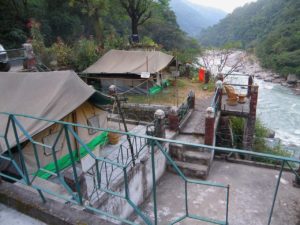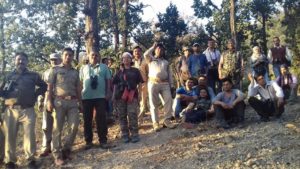
At 53, Yashpal Negi shows just some grey hair as a sign of age. Once on the hillsides of Garhwal, he is no less than a mountain goat. Pursuing the elusive Monal or Koklass pheasant or any of the nearly 250 bird species reported in the region with unmatched vigor, he is trailed closely by curious camera-toting birding enthusiasts. Even after having spent a lifetime among these environs and over 18 years of organized guiding, it is difficult to miss the glint in his eyes and the excitement in his tone as he spots one of the less common species. More than spotting a bird, it is perhaps the thrill of sharing the find with a fellow enthusiast that drives him.
Yashpal Negi: home at heights of Tungnath
An approximate 6-hour drive from Dehradun and a short walk into the village bring you to a patch of mustard in the fields surrounded by pristine oak and rhododendron forests and blue skies above – Makku Mutt village. At 1311 meters above sea level, Makku is the seat of the deity once its abode in Tungnath closes doors for the winter. Makku is also home to Yashpal Negi’s Mandakini Bird Watchers Camp in its new avatar. A temporary residence for the numerous birders who flit in and out year-round enjoying themselves in the company of birdlife and supporting ecosystem.
Sitting on the terrace of his newly constructed “camp” – overlooking the potato patch, Negi is content with his journey so far. He has been a birding guide to over 3000 birding enthusiasts and takes pride in counting India’s top 10 birders among them. Education, he believes is the key to success in forest conservation. Negi takes pride in having trained over 33 nature guides in the recent Uttrakhand Bird Festival. His students hold him in high esteem and Negi hopes that they will carry the torch forward in making people aware of birds, habitats and the resultant need for forest conservation. Negi’s message to his students – “Do not run after money. There are no shortcuts. Focus on acquiring knowledge of birds and sharing it. ” He believes it is the birds of these forests that have made these forests what they are. Birds like the Eurasian Jay, Black-headed Jay, and various thrushes are known to hoard seeds under the ground. While the birds save these seeds for their offspring and for the rainy day, many of them take root and grow into trees. Locally, these birds have been named “Ban Saro”. “Ban” derived from Hindi word “Vann” for forests and “Saro” meaning savior. Therefore, if the birds are safe, the forests will grow.
Today, his spacious camp with guest rooms, a kitchen, and a restaurant remains packed with birders year round. Negi’s success story is an inspiration to many nature guides in the region who endeavor to follow in his footsteps. He has been featured in several stories in leading newspapers like “The Tribune”, Rashtriya Sahara and even Aaj Tak (television news).

Dressed in his camouflage attire and snow shades, equipped with his DSLR and binoculars, the mandatory Grimmet & Inskipp and a mountain load of birding knowledge you could easily mistake him for a savvy forest ranger, but he is much more. Soon after he completed his matriculation in 1980, he lost his father who was a forest contractor. At a tender age, he had to leave education and start taking care of his father’s business of cutting trees. Even as a child he felt that “when a tree fell he could hear it cry”. Having no heart in the business, but still needing to fend for himself and his family, Negi started his career as the trekking guide. Leading pilgrims across the Panch Kedars (5 kedars- Kedarnath, Tungnath, Rudranath, Madmaheshwar, and Kalpeshwar), Negi got his lucky break in the year 2000. He was recommended by the local District Forest Officer to join the Nature Guide Training Program in Corbett National Park. That is when Negi’s love affair with birds blossomed. He picked up on his learning of local birds, their habitats, breeding, nesting, feeding and so on. However, success eluded him in the first few years as birders hardly knew about him. He persisted with his Panch Kedar treks, motivating the trekkers to become bird watchers by spotting birds and telling them stories of the birds and their life. The word got around and soon birders were seeking Negi. Encouraged by the response Negi set up his first Mandakini Bird watchers Camp by the gushing Mandakini in village Kakda on the Kedarnath Road ahead of Srinagar and Augustmuni. Initial stay arrangement was just a room and a couple of tents pitched on land owned by his father just a few meters from the river. There was no electricity and water had to be arranged from the river. Without electricity, birders found it difficult to charge their camera batteries. Evenings were sustained on solar lamps. With time and inflow of birders, Negi added a restaurant and another room.
But, the fruits of labor were short lived. Those nights were the most heartbreaking moments of his life. June 2013: “It had been raining ceaselessly for 3 days 3 nights. We were keeping a constant watch on the big boulder by the banks of Mandakini to check the water level hoping it would recede. But it continued to rise. Around midnight of 16th June while we were sleeping we felt the vibrations as a tremor ran through the small building. It was a signal by Lord Mahadev for us to get going. I and my family of four carrying just some money, my camera, and educational certificates cleared out to higher ground 1 kilometer away and took shelter in a dhaba (roadside restaurant). A few hours later we got news that the lower portion of the building comprising the restaurant and two rooms and area for the tents had been washed away. Little was left to see. Tears were insufficient to justify the loss.” As the Kedarnath tragedy unfolded in the region over 6000 lives were lost. Innumerable lives and livelihoods destroyed. Negi was lost. Even in these moments of grief and uncertainty, he did not forget to thank the superior being or saving him and his family’s life. He returned to his village Makku, with a heavy heart and a lost livelihood.
Mandakini Birders Camp, Kakdagad which got washed away in the Kedarnath Disaster
Gradually, with government support received as compensation and support from his birder community, Negi rebuilt the Mandakini Birders Camp at his village Makku. Jayesh Patel, an ardent birder from Jamnagar says “Negi has proved beyond doubt that he is a man of grit”.

The day he inaugurated the new camp duly attended by birders from different parts of the country was his life’s happiest moment. Even, in the new camp, he has kept space for birds and indeed launched his campaign to save the fast-disappearing sparrows. He has specially crafted space in the brickwork to serve as nests for sparrows in which 28 sparrow families have found a home. He also encouraged his village folks to build similar spaces for sparrows. Today nests number over 100.
Yashpal Negi with his trainees at the Uttarakhand Bird Festival, 2018
On his part Negi soldiers on, advising his village folks not to cut dry trees for firewood. In his own words – “A number of birds have their eyes on the tree. Barbets, woodpeckers, parakeets are looking forward to making it their home”. He constantly reminds the farmers not to cut the green grass that grows tall beside their cultivation patch. The grass seeds are food for a variety of finches and tits.
Bigger challenges lie ahead. The DFO has been pressing for dissolution of the Forest Panchayat and taking the area into the Kedarnath Wild Life Sanctuary. This implies that the community-driven approach to managing the forests will be a thing of the past. This, Negi thinks is not a good development as he believes a community of 500 families can work better to manage the forests as it has been doing for a long time rather than handing it over to the forest department guards. Proposed four lining of the Rishikesh Badrinath Highway, Negi feels is a recipe for “Vinaash”-disaster. It will lead to loss of forest cover and bird habitat. Also, a larger inflow of people and traffic movement imply greater pressure on the land. With these thoughts of impending issues, his phone rings and it is time for him to receive a new set of eager birders.
Submitted by:faiz458@hotmail.com


2 Responses
TkCfyxBu
sopou4